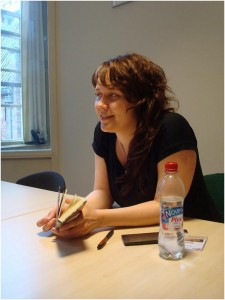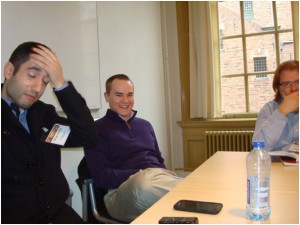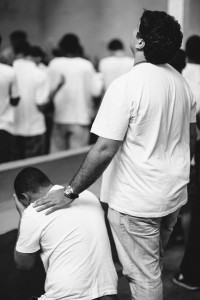Before “Religion”: a History of a Modern Concept
For much of the past two centuries, "religion" has been understood as a universal phenomenon, a part of the “natural” human experience that is essentially the same across cultures and throughout history. Individual religions may vary through time and geographically, but there is an element, religion, that is to be found in all cultures during all time periods. Taking apart this assumption, Brent Nongbri has built upon a generation of critical scholarship to provide the first comprehensive history of "religion" as a category in western discourse.
In his recently published work, Before Religion: a History of a Modern Concept (Yale University Press, 2013), Nongbri shows that the idea of "religion" as a sphere of life distinct from politics, economics, or science is a recent development in European history—a development that has been projected outward in space and backward in time with the result that religion now appears to be a natural and necessary part of our world.
Discussing this book with Jack Tsonis, Nongbri begins by explaining various uses of the term "religio" in Roman and Christian antiquity, which were somewhat different from the modern term "religion". The conversation then moves into the early modern period and the changes wrought by the Reformation, the rise of the political state, and the subsequent period of religious conflict. At this point we begin to see something that looks like the modern English category "religion", although that shift was not fully consolidated until the formalization of philology and ancient world studies in the nineteenth century.
This podcast will interest all students of religion, regardless of their area of speciality. At the core of Nongbri's project is a call for constant vigilance with the categories we use to describe human behaviour. While he does not advocate abandoning "religion", understanding the history of the term does encourage us to use it with greater methodological reflexivity.
You can also download this interview, and subscribe to receive our weekly podcast, on iTunes. If you enjoyed it, please take a moment to rate us. And remember, you can use our Amazon.co.uk, Amazon.ca, or Amazon.com links to support us at no additional cost when you have a purchase to make.
The Uses of “Indigenous Religion”
Since the 1980s, the category of "Indigenous Religion" - or "Religions" - has become a staple feature of the terminology of the study of religion. But what do we mean when we use it? Is it necessarily tied to a particular geographical area? Or something which originates with a particular ethnic group, or something that belongs to all ethnic groups across space and time? To complicate this further, the term has "gone native", and is increasingly being mobilised in political and legal debates.
In this interview, Bjørn Ola Tafjord of the University of Tromsø tells David Robertson about the various uses of "Indigenous Religion", and the theoretical issues which arise from them. Through his work with the Bribris in Talamanca, Tafjord demonstrates how claims to indigeneity are in no way as static, exclusive or obvious as they can at times be presented. Finally, he suggests a way forward, by using the term self-consciously as a relational term.
Global Categories; Local Contexts
Carlo Ginzburg is professor emeritus in History of European Cultures in Scuola Normale Superiore in Pisa, Italy. A distinguished historian with a remarkable career, Ginzburg is known for his microhistorical research approach. His most well-known book The Cheese and the Worms: The Cosmos of a Sixteenth Century Miller follows clues from seemingly small and inconsequential cases and details, in order to illuminate the bigger picture, the richness and complexity of historical phenomena. Other publications include Ecstasies: Deciphering the Witches Sabbath, Clues, Myths and the Historical Method, and The Judge and the Historian: Marginal Notes on a late-twentieth century miscarriage of justice.
The Religious Studies Project had the opportunity to interview Ginzburg at the annual conference of the European Association for the Study of Religions in Groningen, the Netherlands. Ginzburg was one of the keynote speakers of the conference, and his lecture “Traveling in Spirit: From Friuli to Siberia” dealt with interpretative categories and their “wandering beyond the original context.” As a case study, Ginzburg reflected on his own research and the realization that his own work on the Friulianbenandanti was profoundly affected by the work of S.M. Shirokogoroff.
After the keynote, Hanna had a chance to meet professor Ginzburg and hear about his career, his work and his advice for students who wish to pursue the microhistorical research.
You can also download this interview, and subscribe to receive our weekly podcast, on iTunes. If you enjoyed it, please take a moment to rate us. And remember, you can use our Amazon.co.uk, Amazon.ca, or Amazon.com links to support us at no additional cost when you have a purchase to make.
The Holberg Prize 2014 Episode With Michael Cook, “Bigger Things Do Rest On Smaller Things.”
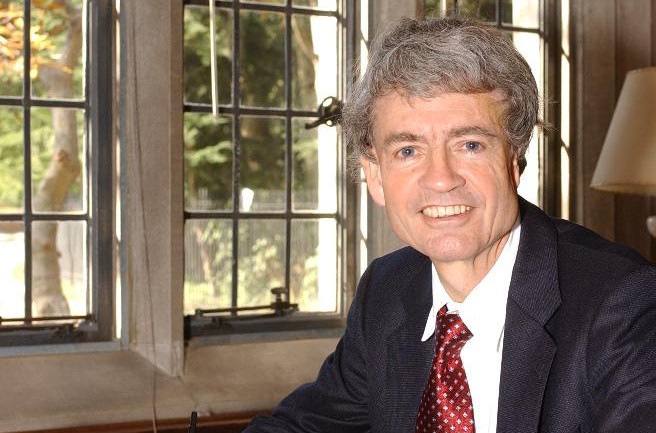
Professor Michael Cook, winner of the Holberg Prize 2014, has had a huge influence on the historical study of Islam. Typical of a historian who knows from experience that there are always sources and perspectives that can skew our perceptions of the past, Cook writes in A Brief History of the Human Race (2003) that he cannot offer any “Grand Unified Theory of History”. Yet, Cook has offered significant insights to Islamic history by means of diligent research, his philological capacity and by a rigorous commitment to scholarship. His contributions have paved new paths for the study of Islam and Near Eastern history, and his legacy will be imprinted on many bibliographies for many decades to come.
In this episode, Knut interviews Professor Cook about his decision to go into history in the first place, about his writing process, the role of the humanities, his reflections about teaching, and why he finds it so important to get the details right.
You can read Knut's presentation on Michael Cook here, and also Cook's speech from the Prize Award Ceremony (highly recommended).
This episode was produced in collaboration with The Holberg Prize 2014. The Holberg Prize is awarded annually to scholars who have made outstanding contributions to research in the arts and humanities, social science, law or theology. The Prize amounts to 4.5 million NOK (approx. 538.000 EUR / 735.000 USD). Visit the website to learn more.
You can also download this interview, and subscribe to receive our weekly podcast, on iTunes. If you enjoyed it, please take a moment to rate us. And remember, you can use our Amazon.co.uk, Amazon.ca, or Amazon.com links to support us at no additional cost when you have a purchase to make.
The Subtle Body
Jay Johnston is a senior lecturer in the Department of Studies of Religion at the University of Sydney. A distinguished interdisciplinary researcher, Johnston is known for her scholarly explorations and elucidations in areas of research concerning subtle bodies; embodiment and intersubjectivity; feminist studies; religion and material culture. In her fascinating books Angels of Desire: Esoteric Bodies, Aesthetics and Ethics (Equinox Publishing, 2008) and Religion and the Subtle Body in Asia and the West: Between Mind and Body (Routledge, 2013) co-edited with Geoffrey Samuel, she establishes innovative theoretical and methodological examinations of notions of subtle embodiment as a shared narrative negotiating the ‘self’ and the ‘other’, and how subtle intersubjectivity is a unique experience of the lived human body within both Western and Eastern religious discourses. Other current projects include the ARC Discovery Project: The production and function of art and design elements in ancient texts and artefacts of ritual power from Late Antiquity in the Mediterranean region with Iain Gardner, Julia Kindt (Sydney); Erica Hunter (SOAS) and Helen Whitehouse (Oxford), and Wellbeing Spirituality and Alternative Therapies with Dr Ruth Barcan.
During the annual conference of the European Association for the Study of Religion at the University of Groningen, the Netherlands, Damon Lycourinos had the pleasure of interviewing Jay regarding her work on the subtle body and alternative notions of intersubjectivity, addressing both the theoretical and methodological implications for the academic study of subtle embodiment, and what the future might hold for this in the academy and beyond.
You can also download this interview, and subscribe to receive our weekly podcast, on iTunes. If you enjoyed it, please take a moment to rate us. And remember, you can use our Amazon.co.uk, Amazon.ca, or Amazon.com links to support us at no additional cost when you have a purchase to make.
“Religion and Pluralities of Knowledge”: A Roundtable Discussion
It's time for another RSP roundtable, folks. Thanks very much to Liam for facilitating this, and to Angus, Essi, George and Hanna for joining him for a stimulating discussion. For now, we'll pass over to Liam to set the scene...
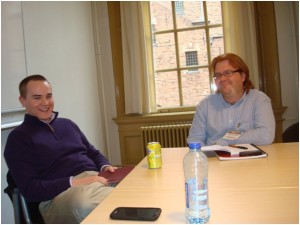
"This year scholars from across the globe gathered in the city of Groningen in the north-west of the Netherlands for the annual conference of the European Association for the Study of Religion (EASR), acolytes of the Religious Studies Project among their number. We were hosted by a University on the brink of celebrating its 4ooth year and which looked forward to infinity and beyond! To a city whose name, the President of the University no less assured us is pronounced with a guttural g-, a rolled –r and a silent –g to finish! Not too difficult for a Scotsman but there was plenty of beer, wine and gin to aid in this process
The conference theme this year was ‘religion and the plurality of knowledge’, a topic which I initially considered dubious but which proved to be deeply pertinent. It became clear to me at least, during the many presentations and discussions taking place, that there was a division between those who regarded the kind of knowledge which should be accepted within the field to be singular – rooted in science and empiricism and those who thought the field should be open to a range of types of knowledge.
To address this issue there was only solution for the RSP: hold a roundtable of course! So, in a small room a group of bright young things gathered around ‘Steve’ the dictaphone to have a discussion. Also I was there! They even let me chair it and put up with my no doubt flawed attempt to kick off proceedings in Dutch! So apologies to the people of the Netherlands and His Majesty King Willem-Alexander for that, but it was done with the best of intentions!
It became pretty clear that our cosy little group was not immune to the great gulf widening throughout the conference. Boorishly, from my privileged position of power I set out my case for exclusivity which clearly did not impress Angus and George but luckily Hanna and Essi appeared to be on my side….
What ensued was a debate as heated as it was enjoyed by all (I hope) and which continued long into the evening, kept afloat by a sea of libations! We hope you enjoy the discussion as much as we did and that it will add to the debate on these vital questions."
You can also download this discussion, and subscribe to receive our weekly podcast, on iTunes. If you enjoyed it, please take a moment to rate us. And remember, you can use our Amazon.co.uk, Amazon.ca, or Amazon.com links to support us at no additional cost when you have a purchase to make.
Visual Culture and the Study of Religion
Birgit Meyer is Professor of Religious Studies at the University of Utrecht, The Netherlands. A distinguished and prolific scholar who trained as a cultural anthropologist and who worked on lived religion in Ghana for more than 20 years, Meyer is vice-chair of the International African Institute, a member of the Royal Dutch Academy of Arts and Sciences, and one of the editors ofMaterial Religion. She has been a leading voice for some time in such topics and fields as diverse as the colonial missions and local appropriations of Christianity, the rise of Pentecostalism in the context of neoliberal capitalism, popular culture and video-films in Ghana, the relations between religion, media and identity, the study of lived and material religion, and the place and role of religion in the 21st century more broadly. She is the author of Translating the Devil: Religion and Modernity Among the Ewe in Ghana, editor of Aesthetic Formations: Media, Religion and the Senses, and co-editor of Globalization and Identity: Dialectics of Flow and Closure, Magic and Modernity: Interfaces of Revelation and Concealment, Religion, Media and the Public Sphere, and Things: Religion and the Question of Materiality.
Along with Bruno Latour, Carlo Ginzburg, and Jörg Rüpke, Professor Meyer was a keynote speaker at the European Association for the Study of Religions (EASR) and Dutch Association for the Study of Religion (NGG) Joint Conference held at the University of Groningen, The Netherlands, 11-15 May 2014. Meyer’s keynote address, ‘Visual Culture and the Study of Religion,’ sought to make an intervention into the study of religion and material and visual culture through an understanding of religion as a practice of mediation, one in and through which some kind of spiritual or divine presence, however conceptualised, is effected, actualised, or materialised. Meyer argued that such an understanding of religion as mediation allows us to draw attention to the fascinating issue of religious images and sensory regimes, thinking through the implications of placing such visual culture and a consideration of material, multi-sensuous embodiment at the core of scholarly inquiry for the production of knowledge about religion.
After the keynote, George Ioannides had the opportunity to meet with Professor Meyer to discuss her work, her career, her views on the importance of studying religion and/as material and visual culture, and her advice for students who similarly wish to research topics at the intersection of cultural anthropology and the study of religion.
You can also download this interview, and subscribe to receive our weekly podcast, on iTunes. If you enjoyed it, please take a moment to rate us. And remember, you can use our Amazon.co.uk, Amazon.ca, or Amazon.com links to support us at no additional cost when you have a purchase to make.
From 30 June, the RSP will be on "summer vacation". This means no regular podcasts and posts until mid-September. However, we will endeavour to bring you some material, including weekly opportunities digests, and you can follow our regular updates on our social media pages. Thanks for listening!
Religion and Memory
In the year 2000, English-speaking scholars interested in ‘religion’ were introduced (in translation) to one of the most important texts in the sociology of religion in recent years, Danièle Hervieu-Léger’s “Religion as a Chain of Memory”. This book placed the study of ‘religion and memory’ firmly on the academic agenda, and the past decade has seen an explosion of exciting research into this area, not least in the cognitive sciences.
As testament to this growth of research, the Alexandra Grieser (Trinity College Dublin) on this intriguing topic.
How does it help the study of’ religion’ to think about it through the lens of memory? Links with cognitive approaches? Is ‘memory’ different from ‘tradition’? ‘Memorialisation’? ‘Myth’? ‘Legend’? ‘Story’? What makes religion distinctive in this sense? Are we not just studying memories? In what sense is basically every element of research an act of research into memory? An act of memorialisation? Must all ‘memory’ and ‘experience’ be articulated in order to be studied? These questions and more form the framework for this interview, which demonstrates the utility of thinking about ‘religion’ theoretically and methodologically through the interpretive lens of memory.
You can also download this interview, and subscribe to receive our weekly podcast, on iTunes. If you enjoyed it, please take a moment to rate us. And remember, you can use our Amazon.co.uk, Amazon.ca, or Amazon.com links to support us at no additional cost when you have a purchase to make. We hope that you have missed us during our 'summer break', and we look forward to bringing you weekly podcasts up until our next break in the winter.
Os serés matáves: Pentecostalism in the Prisons of Rio
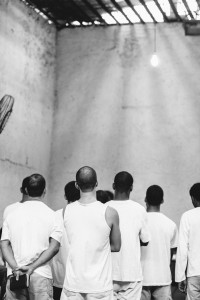 Rio de Janeiro, Brazil is a city of over six million people; it is known for its exotic nightlife, white sand beaches, crystal blue water, and of course, one of the most famous bosa nova songs ever: The Girl From Ipanema. However, beyond the sunny beaches, veritable entertainment, and soothing music lies a very different scene – the Rio de Janeiro prison system. Inside the towering grey concrete walls live Rio’s os serés matáves, or roughly translated into English as, “the killable people”. These “killable people” are comprised mostly of proletariat and unemployed minorities with crimes ranging from the benign to the bloody. Gangs rule the prison and every day at 6 pm deafening war cries echo out from within the concrete walls as prison gangs scream allegiance to their “commander” – the head gang leader who runs the prison. The guards largely remain on the outskirts of the prison, they don’t control much of what happens within, as it is too dangerous to go inside. [Note: While the prison system is, of course, very dangerous, the guards' absence is also due to the penology practiced in that country.]
Rio de Janeiro, Brazil is a city of over six million people; it is known for its exotic nightlife, white sand beaches, crystal blue water, and of course, one of the most famous bosa nova songs ever: The Girl From Ipanema. However, beyond the sunny beaches, veritable entertainment, and soothing music lies a very different scene – the Rio de Janeiro prison system. Inside the towering grey concrete walls live Rio’s os serés matáves, or roughly translated into English as, “the killable people”. These “killable people” are comprised mostly of proletariat and unemployed minorities with crimes ranging from the benign to the bloody. Gangs rule the prison and every day at 6 pm deafening war cries echo out from within the concrete walls as prison gangs scream allegiance to their “commander” – the head gang leader who runs the prison. The guards largely remain on the outskirts of the prison, they don’t control much of what happens within, as it is too dangerous to go inside. [Note: While the prison system is, of course, very dangerous, the guards' absence is also due to the penology practiced in that country.]
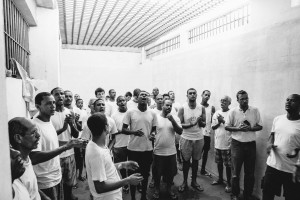
For Brazil’s “killable people”, there are two prevalent ways to deal with the relative hell of prison - both involving allegiance and devotion. You can give your life to the gang or give your life to God. Only three types of people dare to venture into the heart of a Rio de Janeiro prison: the condemned, the pentecostal pastors leading the prison ministry, and curiously brave sociologists such as Dr. Andrew Johnson.
In his interview with Thomas J. Coleman III, Dr. Johnson begins by discussing the preparation leading up to his ethnography of the Pentecostal prison ministries in Rio de Janero Brazil. He takes the listener through the streets and slums of Rio, and into a prison cell-block. Here, we learn about the gang life that largely runs the prison, and the “gang like” life (Pentecostal prison ministries) that can provide a temporary escape from the physically and psychologically damaging conditions of the jail, and might just provide eternal redemption through the faith of the pious prisoner. Johnson discusses the role of politics in the prison system, why Pentecostalism dominates the jails in a predominately catholic country such as Brazil, and “answers” the question of how to tell if someone is truly faithful. He discusses how prisoners are viewed by their community after their release, and upon conversion as an allegedly devout pentecostal. In closing, Dr. Johnson speculates about the future of pentecostal prison ministries in Brazil, and argues for “the religious lives of inmates being taken seriously apart from recidivism rates”.
Be sure to check out Dr. Johnson’s plenary address, the world debut of his documentary If I Give My Soul, at the 2014 Society for the Scientific Study of Religion conference in Indianapolis Indiana October 31st – November 2nd. You can register for the conference here: SSSR registration link.
You can also download this interview, and subscribe to receive our weekly podcast, on iTunes. If you enjoyed it, please take a moment to rate us. And remember, you can use our Amazon.co.uk, Amazon.ca, or Amazon.com links to support us at no additional cost when you have a purchase to make.
Studying Vernacular Religion in the US
Vernacular religion is a subject which fascinates us here at the RSP, because in keeping with our critical perspective, it challenges that idea that neat categorical boundaries may be drawn, and reminds us that when attempts are made to draw them, particular interests are being served. David Robertson was given the chance to sit down with Leonard Norman Primiano - one of the pre-eminent scholars of that field - at the BASR 2014 conference in Milton Keynes earlier this month, and we are delighted to bring you the fruits of that meeting today.

Primiano is Professor and Chair of Religious Studies at Cabrini College in Radnor, Pennsylvania. He has published widely - please click his photo in the right-hand column above for details of his recent publications. He is currently curating Graces Received, an exhibition of painted and metal ex votos from Italy at Cabrini College until October 26th, 2014. It will open at Indiana University’s Mathers Museum of World Cultures in January for the Spring semester.
You can also download this interview, and subscribe to receive our weekly podcast, on iTunes. If you enjoyed it, please take a moment to rate us. And remember, you can use our Amazon.co.uk, Amazon.ca, or Amazon.com links to support us at no additional cost when you have a purchase to make.



